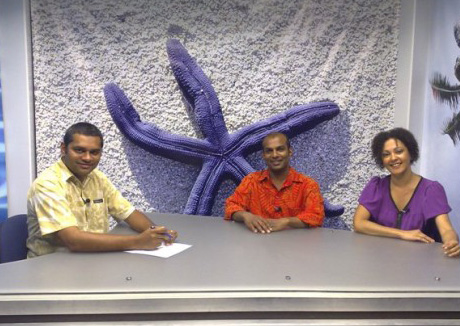
NUKU'ALOFA: Fiji news organisations have to face reality and make ethical and professional decisions in the “dramatically changed” media landscape, a regional workshop in Tonga on building a vibrant Pacific media has been told.
Stanley Simpson, news director of the Fiji Broadcasting Corporation and an award-winning journalist, said that a major ethical question confronting journalists over the past year had been: “How do we report and practise the principles of journalism under a censored environment?”
He said this was particularly so over the principles of being “fair and balanced” when reporting a story and verifying its accuracy.
“In Fiji, we are dealing with the reality. That is why – while I may not agree with the decisions being made by some media organisations in Fiji - I will never criticise their decision,” he said.
“Everyone is responding to the difficult reality before them at this time – and have made the decisions they see fit after considering all
the options.
“People from outside can criticise the decision or stance each media organisation has taken – but ultimately it is us who will live with this decision, and will be taken to account in due time by our viewers, readers and audience.
“Five years from now we may see and accept that we either made the right or wrong decisions – but right now we are dealing with the reality we are being faced with.”
Censorship regime
Fiji news media are now regulated by a two-month-old Media Industry Development Decree and have been under a monthly censorship regime imposed by the military-backed government since April 2009. The decree imposes tough sanctions for breaches by media organisations and journalists.
The Fiji government is determined to push through its plan for the economic and political development of the country until 2014 and wants to ensure that the media cannot derail this.
Simpson, one of the pioneering journalism degree graduates from the University of the South Pacific in the mid-1990s and one of Fiji’s most innovative journalists, was appointed to the FBC role eight months ago.
“Another dilemma being faced is merging what you think or believe is right – and what role you need to play as a journalist or media organisation,” he said.
“Everyone in Fiji has their personal view on whether the currentgovernment in Fiji was right or wrong to do what it did in 2006 and now.
“This provides an ethical dilemma for many journalists in Fiji.
“What media ethics or media principles should we apply?
Simpson pointed out that the guidelines under the decree were “almost word for word” the code of ethics adopted by the Fiji Media Council before the imposed law came into force.
He also said that as the public broadcaster, FBC’s message to journalists was to “stick and abide stronger than ever to the foundation principles of journalism – fairness, balance and accuracy”.
“We also constantly remind ourselves who we are here to serve – the people of Fiji – and what kind of information is important that they get,” he said.
The "vibrant media" workshop ended a three-day Pacific Media Partnership meeting sponsored by the Asia-Pacific Institute for Broadcasting Development (AIBD) and a raft of other international bodies with support from the Tonga Broadcasting Commission. - Pacific Media Watch



